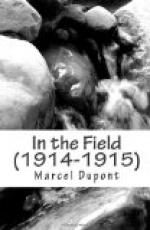But just as I was coming up to it I heard a curious hissing noise which lasted about the twentieth part of a second, and, above my head—how high I could not quite tell—vrran!... vrran!—two shells exploded with a tremendous noise. I ducked my head instinctively and tried to make myself as small as possible on my horse. A thought passed through my mind like a flash: “Here we are! Why on earth did I come up here? My campaign will have been a short one!” And then this other thought followed: “But I’m not hit! That’s all their shells can do! I shan’t trouble to duck in future.”
And yet I was disagreeably impressed: a soldier who had been holding a horse just before about 30 yards from me ran down the slope, whilst the horse was struck dead and lay in a pool of blood, his body torn open.
But I was now close to the officers composing the Staff of the T. Brigade. They came towards me, supposing, probably, that I was bringing some information or an order. One of them was known to me, an infantry captain who had been in garrison at R. with me. We shook hands, and I explained the object of this unusual visit. He replied:
“Your regiment? You will find it to the left of the Army Corps. It’s the regiment that ensures our liaison with the —— Corps.”
“Well, Captain, it seems our troops are advancing. Things are going well!”
He shrugged his shoulders sharply. His eyes were hard and sombre as he gazed fixedly at the horizon in the direction of the enemy, and then said in an exasperated tone:
“Certainly, they are advancing. See those lines of skirmishers working along there to the right of the village. And those others further off, there where you see those puffs of yellow smoke. But that won’t prevent us from beginning our retreating movement at noon. There are express orders. We must move together with the whole army. We shall sleep to-night 20 kilometres from here ... and not in the right direction!”
We looked at one another in silence. I didn’t like to ask any further questions, nor to express my disappointment and the angry feeling that was becoming stronger in me. The sight of General T. calmed me at once. It seemed to tell me what my duty was, and to impose silent obedience and firm faith in our chiefs.
Standing alone, 100 yards in advance of his officers, whom he had told to remain concealed behind the enormous stack, the General was observing the struggle. He stood perfectly still, with his back slightly bent and his hands behind him. He had allowed his beard to grow, and it formed a white patch on his slightly tanned face. In front of him, at some little distance, two shells had just burst, falling short. The General had not stirred. He looked like a statue of sadness and of duty. I had thought of going and introducing myself; but I now felt that I was too insignificant a being to intrude myself upon a chief who was watching the advance of his brave soldiers, as a father watches over his children.




